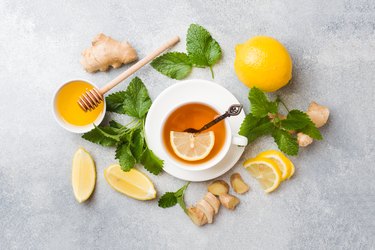
Have you ever tried ginger water for detox or weight loss? This antioxidant-rich beverage takes minutes to prepare and has a refreshing flavor. Plus, it's a convenient way to incorporate ginger into your diet and reap its health benefits.
What Is Ginger Water?
Video of the Day
Ginger water has emerged as a natural detox remedy. While its detoxifying properties are questionable, it does have other potential benefits you may want to consider. Ginger, its main ingredient, has been used as a food and medicine for centuries. It's rich in phytochemicals that fight inflammation, support immune function and promote digestive health.
Video of the Day
According to an April 2013 review published in the International Journal of Preventive Medicine, ginger exhibits anti-inflammatory, antioxidant and anti-cancer properties. In clinical trials, it showed promising results in the treatment of diabetes, heart disease, stomach ulcers, arthritis and digestive disorders. Gingerol, zerumbone, shogaol and other phytochemicals in this spice may protect against cancer, but more research is needed in this area.
There are several ways to consume ginger — you can use it to spice up your meals, drink ginger water alone or in ginger and lemon water, or add ginger powder to smoothies and fresh juices. Ginger water, or ginger tea, is a healthful concoction made by boiling fresh ginger root. You may also add freshly squeezed lemon juice, turmeric, raw honey and other natural ingredients.
Read more: 10 Everyday Ailments Soothed by Tea
Most recipes call for 2 or 3 cups of water and a small piece of ginger root (1-to-2 inches long) or 1 tablespoon of grated ginger. Boil the water, add ginger, remove it from heat and let it steep for up to 10 minutes. Strain the mixture and drink it warm or cold.
Ginger Tea Benefits Your Health
This spice has emerged as a natural remedy for nausea, indigestion, bloating and inflammatory disorders, among other common ailments. Ginger tea is just as beneficial.
A research article published in the April 2015 edition of Food Science & Nutrition suggests that combining tea and ginger extracts may increase the antioxidant value of both ingredients. As the scientists note, ginger is a good source of catechins, gingerols and other polyphenols. Tea contains catechins with anti-diabetic, antimicrobial and anti-inflammatory effects.
What this means is that you could add ginger to your tea instead of plain water to make an antioxidant-rich drink. For example, you may combine ginger root and green tea, black tea or oolong tea.
Antioxidants are naturally occurring compounds that protect against the free radicals resulting from exposure to cigarette smoke, pesticides, environmental pollutants and other harmful chemicals. They also scavenge oxidative stress, a major contributor to inflammation, cell damage, cancer, atherosclerosis and neurological disorders.
Another review, featured in Gastroenterology Research and Practice in March 2015, assessed the role of ginger in gastrointestinal cancer prevention and treatment. Gastrointestinal cancer is an umbrella term for cancers of the colon, liver, stomach, esophagus, gallbladder and other organs responsible for digestion. Researchers state that ginger may induce cancer cell death, reduce the incidence of adenomas and suppress certain compounds that promote tumor growth.
Enjoy Better Digestion
As mentioned earlier, this spice is commonly used as a digestive aid. A review published in Food Science & Nutrition in November 2018 confirms its beneficial effects on digestion. The ingestion of as little as 1.5 grams of ginger may help relieve nausea.
Furthermore, this spice has been shown to accelerate gastric emptying, increase gastrointestinal motility and prevent bloating. If you're struggling with gas and constipation, reach for a cup of ginger tea. It's a safe, effective way to keep your digestive system running smoothly.
Ginger tea benefits expecting mothers too, according to the above review. In clinical trials, it has been found to work just as well as dimenhydrinate, metoclopramide and other anti-nausea drugs, but with fewer side effects.
Researchers also point out that ginger may relieve stomach pain, reduce liver fat and improve insulin response. On top of that, its side effects are negligible. In rare cases, it may cause mild digestive discomfort and heartburn. This spice may also aid in weight loss due to its appetite-suppressing and fat-burning properties, but more human trials are needed to confirm it.
So, are you ready to give it a try? Ginger water isn't just delicious but healthy, too. Mix it with lemon or lime juice and stevia for extra flavor. Start your day with a cup of hot ginger tea to keep your digestive system running smoothly. Enjoy it warm or ice-cold between meals to quench your thirst and boost your antioxidant intake.
- International Journal of Preventive Medicine: "Anti-Oxidative and Anti-Inflammatory Effects of Ginger in Health and Physical Activity: Review of Current Evidence"
- Food Science & Nutrition: "Optimization and Prediction of Antioxidant Properties of a Tea‐Ginger Extract"
- Oxidative Medicine and Cellular Longevity: "The Protective Role of Antioxidants in the Defence Against ROS/RNS-Mediated Environmental Pollution"
- NCBI: "Oxidative Stress: Harms and Benefits for Human Health"
- Gastroenterology Research and Practice: "Ginger and Its Constituents: Role in Prevention and Treatment of Gastrointestinal Cancer"
- Food Science & Nutrition: "Ginger in Gastrointestinal Disorders: A Systematic Review of Clinical Trials"
- Phytotherapy Research: "A Systematic Review of the Anti‐obesity and Weight Lowering Effect of Ginger (Zingiber Officinale Roscoe) and Its Mechanisms of Action"